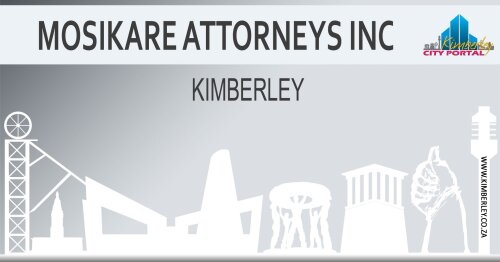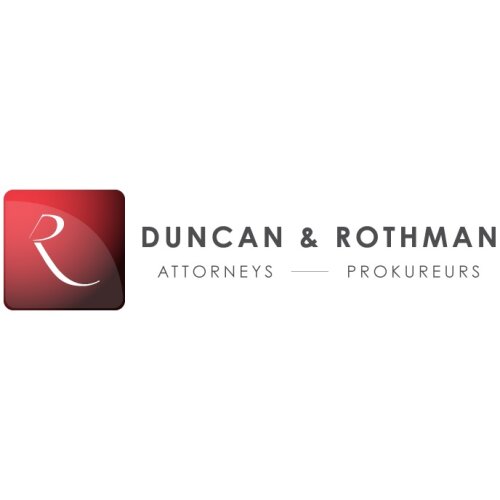Best New Business Formation Lawyers in Kimberley
Share your needs with us, get contacted by law firms.
Free. Takes 2 min.
List of the best lawyers in Kimberley, South Africa
About New Business Formation Law in Kimberley, South Africa
The creation of new businesses or companies in Kimberley, South Africa is governed by the Companies Act, 2008. This legislation spells out in detail the rules and regulations for incorporating different types of companies, partnerships, or any other form of business entity. It covers key aspects such as the formation process, rights and responsibilities of directors, corporate governance, and business conduct. Compliance with local regulations and the national Companies Act is essential for successful and lawful business operation in Kimberley.
Why You May Need a Lawyer
Forming a new business entails dealing with various legal requirements that might be complex for individuals without law backgrounds. A lawyer can provide several services including drafting essential documents, understanding tax obligations, identifying potential risks, ensuring compliance with laws, dealing with disputes, and providing advice on intellectual property rights. Additionally, having a lawyer with local knowledge and expertise can be very beneficial in navigating through municipal by-laws, provincial regulations and national legislation seamlessly.
Local Laws Overview
According to Kimberley’s local regulations, individuals need to register new businesses with the Companies and Intellectual Property Commission (CIPC). The business formation process involves drafting a Memorandum of Incorporation (MOI), which outlines the company’s structure and stipulates its rules. Once the MOI has been drafted, it needs to be filed with the CIPC. Businesses also need to comply with local zoning laws, have the necessary trade licenses, and adhere to specific tax regulations. Additionally, businesses may need to conform to stipulations related to B-BBEE (Broad-Based Black Economic Empowerment) policies.
Frequently Asked Questions
What kind of businesses can be formed in Kimberley?
The Companies Act allows the establishment of various entities including private companies, public companies, personal liability companies, and non-profit companies.
What are the local zoning laws in Kimberley?
Kimberley’s zoning regulations determine the type of business activities that can be conducted in certain areas. A lawyer can assist in understanding these regulations and obtaining permission for running a business in a specific location.
What is B-BBEE and how does it affect my business?
B-BBEE is a government policy aiming to ensure equitable economic opportunities by promoting participation of previously disadvantaged groups in business. Depending on your business structure and operations, certain B-BBEE requirements may apply to your business.
What tax regulations should my business abide by?
This can depend on the nature and structure of your business. All businesses must register for income tax and certain businesses may be liable for VAT, PAYE, and other taxes.
Can a non-South African form a business in Kimberley?
Yes, non-South Africans can form businesses in Kimberley provided they adhere to specific conditions and fulfil all the necessary legal, immigration and economic sector requirements explained in the country's Immigration Act.
Additional Resources
The Companies and Intellectual Property Commission (CIPC) and South African Revenue Service (SARS) websites are excellent resources that can provide crucial information. Various local business development agencies, chambers of commerce, and government websites can also provide useful support and information to new entrepreneurs.
Next Steps
If you wish to proceed with forming a business, it is important to consult with an experienced lawyer who can provide advice tailored to your specific needs. This will involve looking at your business plan, discussing the most appropriate type of entity to form, and taking you through each step of the process to ensure your new business meets all legal requirements.
Lawzana helps you find the best lawyers and law firms in Kimberley through a curated and pre-screened list of qualified legal professionals. Our platform offers rankings and detailed profiles of attorneys and law firms, allowing you to compare based on practice areas, including New Business Formation, experience, and client feedback.
Each profile includes a description of the firm's areas of practice, client reviews, team members and partners, year of establishment, spoken languages, office locations, contact information, social media presence, and any published articles or resources. Most firms on our platform speak English and are experienced in both local and international legal matters.
Get a quote from top-rated law firms in Kimberley, South Africa — quickly, securely, and without unnecessary hassle.
Disclaimer:
The information provided on this page is for general informational purposes only and does not constitute legal advice. While we strive to ensure the accuracy and relevance of the content, legal information may change over time, and interpretations of the law can vary. You should always consult with a qualified legal professional for advice specific to your situation.
We disclaim all liability for actions taken or not taken based on the content of this page. If you believe any information is incorrect or outdated, please contact us, and we will review and update it where appropriate.













